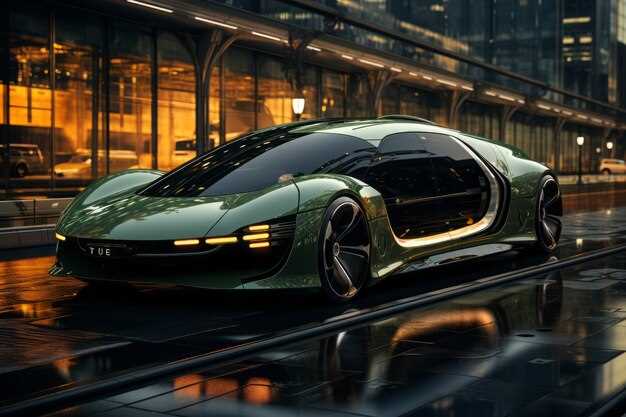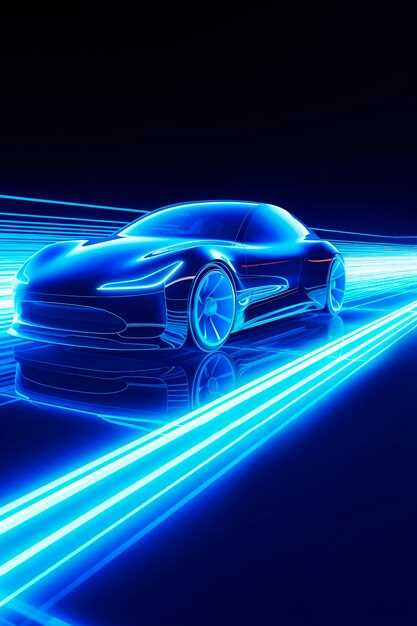
The world of racing is undergoing a revolutionary transformation as electric vehicles (EVs) take center stage. With increasing concerns about climate change and the pursuit of sustainability, motorsport is evolving to embrace the future through the integration of cutting-edge electric technology. These electric race cars not only challenge traditional notions of speed and performance but also pave the way for a more environmentally friendly approach to competitive racing.
As teams invest in electric powertrains, the dynamics of racing are changing significantly. EVs are proving that they can deliver exhilarating speed, impressive torque, and unparalleled efficiency on the track. Unlike their gasoline-powered counterparts, electric race cars offer a unique driving experience, showcasing remarkable acceleration and innovative design that can captivate fans around the globe.
The rise of electric motorsport extends beyond just performance enhancements; it is also about redefining the relationship between technology and the audience. With enhanced connectivity and data-sharing capabilities, fans can engage with races in unprecedented ways, fostering a new generation of motorsport enthusiasts who are passionate about sustainability and innovation. As racing evolves, the electrification of the sport is not merely a trend but a significant shift towards a sustainable future that could reshape the entire industry.
How Battery Technology Is Shaping EV Racing Performance

In the realm of electric vehicle (EV) racing, battery technology plays a crucial role in determining performance, efficiency, and overall competitiveness. As motorsport moves towards sustainable solutions, advancements in battery systems are essential for meeting the demands of high-speed racing.
Energy Density is a key factor in enhancing the performance of electric race cars. The higher the energy density of a battery, the more energy it can store without increasing weight. Modern lithium-ion batteries, commonly used in EVs, are continually being optimized to provide better energy density. This allows for longer race durations and improved acceleration, giving teams a significant edge on the track.
Another important aspect is charging technology. Rapid charging capabilities can drastically reduce pit stop times for electric racers. Innovations such as ultra-fast charging stations enable batteries to be replenished in mere minutes, allowing teams to strategize more effectively and extend their racing capabilities without compromising on speed or performance.
Battery management systems (BMS) have also seen remarkable advancements. These systems monitor the state of the battery while managing factors like temperature and charge control. With sophisticated BMS, teams can optimize performance during races by adjusting power delivery according to real-time data, enhancing both efficiency and handling characteristics.
The weight of the battery significantly impacts overall vehicle dynamics. Engineers are focused on developing lightweight battery technologies that do not compromise energy output. Solid-state batteries are emerging as a promising solution, offering higher energy density and reduced weight compared to traditional lithium-ion designs. This can lead to lighter electric race cars that are more agile and faster on the track.
As technology continues to evolve, the integration of renewable energy sources into battery production and recycling processes becomes more viable. This not only enhances the sustainability of electric racing but also ensures that the entire lifecycle of EV batteries contributes positively to the environment.
In summary, battery technology is undeniably shaping the future of EV racing. With improvements in energy density, charging speed, battery management, and weight reduction, electric race cars are becoming more competitive, pushing the boundaries of what is possible in motorsport.
The Role of Sustainability in the Growth of Electric Motorsport

The integration of sustainability into the realm of electric racing (EV racing) has emerged as a pivotal factor in its expansion. As environmental concerns become more pressing, the motorsport industry is responding by embracing electric vehicles (EVs), thus aligning with global sustainability goals.
Several key aspects underline the importance of sustainability in promoting electric motorsport:
- Reduction of Carbon Emissions: Electric race cars produce zero tailpipe emissions, significantly lowering the carbon footprint associated with traditional motorsports. This shift contributes positively to the fight against climate change.
- Innovation in Battery Technologies: The push for energy-efficient EV racing has accelerated advancements in battery technology. Improved battery performance and longevity not only enhance racing but also have far-reaching implications for everyday electric vehicles.
- Promotion of Sustainable Practices: Electric motorsport encourages the adoption of sustainable materials and practices throughout the racing ecosystem, from the production of components to the management of race events.
- Engagement with Consumers: The sponsorship and branding opportunities associated with electric racing resonate with a growing audience that values sustainability. This engagement fosters a new generation of fans who prioritize eco-friendly initiatives.
Moreover, the commitment to sustainability shapes the regulatory framework of electric motorsport:
- Regulatory Support: Governing bodies are increasingly instituting rules favoring electric racing. Initiatives like the FIA Formula E Championship reflect a strategic pivot towards greener motorsport alternatives.
- Incentives for Teams: Financial incentives are being introduced to teams that invest in sustainable technologies. This encourages further innovation within the electric racing community.
- Collaboration with Environmental Organizations: Partnerships between motorsport entities and environmental NGOs promote awareness and facilitate joint initiatives aimed at enhancing sustainability.
As electric racing continues to gain traction, the commitment to sustainability will further bolster its growth. The shift to EVs in motorsport not only represents a technological evolution but also reflects a broader cultural transformation towards responsible practices. In essence, sustainability is not merely a trend; it is a crucial element driving the future of electric motorsport.
Future Innovations: What’s Next for Electric Racing Series?
The world of electric racing is on the brink of a technological revolution, driven by advancements in EV performance and sustainability. As teams and manufacturers invest in research and development, several innovations promise to redefine the landscape of electric motorsport.
One significant area of progress lies in battery technology. Next-generation batteries are expected to improve energy density, allowing electric race cars to cover longer distances without compromising performance. Solid-state batteries, in particular, offer enhanced safety and faster charging times, potentially transforming race strategies and pit stop dynamics.
Additionally, advancements in aerodynamics and lightweight materials are crucial. Incorporating materials such as carbon fiber and innovative designs will reduce vehicle weight, thereby increasing speed and efficiency. These improvements will enable EV racing teams to push the boundaries of what is possible on the track.
Another key innovation is the integration of artificial intelligence and machine learning in racing strategies. Enhanced data analytics can optimize vehicle performance during races, enabling teams to make real-time adjustments based on track conditions, competitor actions, and weather changes. This technology will enhance drivers’ decision-making abilities, resulting in more competitive and exciting races.
The sustainability aspect of electric racing will also see significant enhancements. As the motorsport community becomes more committed to environmental responsibility, initiatives such as closed-loop recycling systems for batteries and the use of renewable energy sources for powering events will become commonplace. These efforts will solidify the position of electric racing as a pioneer in eco-friendly practices.
Lastly, fan engagement will evolve through innovations in virtual reality (VR) and augmented reality (AR). These technologies will allow spectators to experience races in immersive ways, enhancing their connection to the sport and its participants. Engaging fans on multiple platforms will ensure a wider reach and foster a passionate community around electric motorsport.
In conclusion, the future of electric racing series is bright, fueled by a commitment to innovation and sustainability. As technological advancements continue to emerge, stakeholders in the motorsport industry will need to adapt and embrace these changes to remain competitive in this rapidly evolving landscape.




